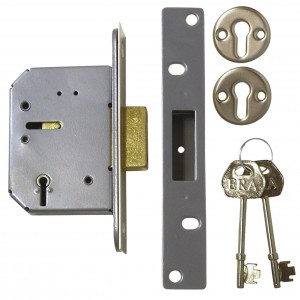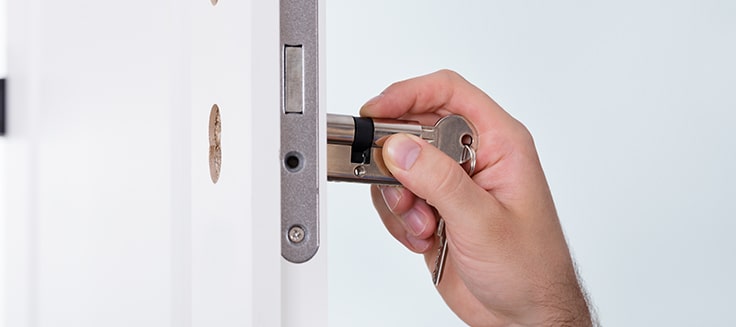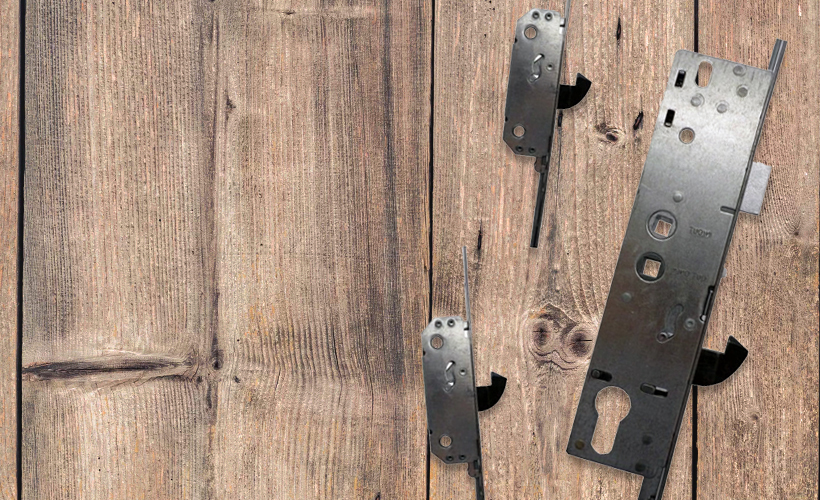Ever found yourself standing in front of a massive wall of types of door locks, scratching your head, feeling lost and overwhelmed?
You're not alone.
We've all been there. A sea of choices - mortice deadlocks, euro cylinder locks, night latches...it's enough to make anyone's eyes glaze over. But let me tell you this: the right lock can be your home’s first line defence against burglars.
Don’t worry! This post will help turn that wall from daunting to doable. It'll demystify different types such as lever mortices and rim cylinders or even how the standard kitemark on British Standard Locks works.
This isn't just about choosing any old lock; it’s about securing peace for your sanctuary. Keep reading...
Your home is your castle, but it's only as secure as the locks on its doors. Comprehending door fastenings isn't just about recognising how to manipulate a key; it requires an insight into the assorted varieties of locks and their particular mechanisms.
A basic type you might be familiar with is the mortice lock. Commonly found on wooden doors, this traditional house lock operates by a mechanism known as 'lock picking'. But don't worry, this doesn’t mean that anyone can pick your lock. It refers to the locksmith work required when keys get lost or broken inside the lock.
Moving onto something more complex: have you heard of 'keyed alike'? This system lets multiple locks open with one single key – pretty convenient if you ask me.
Now let’s talk burglary techniques - not because we want to scare you or turn you into criminals, mind. The knowledge could help make sure your home stays yours alone. One common technique burglars use is 'bumping', where they manipulate a special key in order to unlock cylinder-type door locks such as Euro Cylinder and Rim Cylinder ones. Knowing these tricks allows us to take necessary precautions against them.
For example, consider using British Standard approved products like mortice deadlocks which come engraved with standard kitemark indicating they are up-to-par security-wise. Remember: forewarned is forearmed.
No two homes are identical – nor should their security systems be. From rim automatic deadlatches typically used in flats due to their ability for automatic locking upon closing; lever mortice deadlocks providing additional safety on external timber doors; multi-point locks which secure the door at multiple points with a single turn of the key – each lock type is suited for different door types.
Don't fret - an experienced locksmith like us at Keys 4 U can help you select the perfect lock for your property. With help from expert locksmiths like us at Keys 4 U, you're guaranteed to find a secure and fitting solution for your needs.
Understanding Your Locks: Home security starts with knowing your door locks. From traditional mortice to complex 'keyed alike' systems, each lock type offers unique benefits and mechanisms.
Burglary Defence Tactics: By understanding common burglary techniques, such as 'bumping' which is used on cylinder-type locks, you can better protect your property and stay one step ahead.

Let's dive into the world of mortice locks, specifically deadlocks and lever mortice deadlocks. Often used on wooden doors, these types are both secure and durable.
A standard 5 Lever Mortice Deadlock is a common choice for wooden doors. The lock interacts with the door frame in such a way that it makes unauthorized entry quite challenging.
British Standard has upped this security game by introducing their BS3621 compliant version of this lock. You might be wondering why you need to bother about standards?
The answer lies in our key stats: A 5 Lever Mortice Deadlock conforming to BS3621 is more secure than its standard counterpart. That means higher protection for your home or office.
To get one fitted correctly, you'd want an expert locksmith at work - someone who knows how each tiny component inside the lock functions together.
You see, getting the deadlock right is crucial as it directly interacts with your door frame when locked – providing an extra layer of safety against forced entries.
If we go one step further from ordinary mortices, there comes 'Lever' variant - making them even more burglar-resistant. Yes. I'm talking about lever mortice deadlocks which have become increasingly popular among homeowners seeking advanced level security features.

If you're after a lock that's easy to change, then cylinder locks are your best bet. The most common types of these are Euro cylinder locks and rim cylinder locks.
Now, if you have UPVC or composite doors at home, chances are they already come with a euro cylinder lock fitted. This is because the euro cylinder is incredibly versatile and fits seamlessly into different door types.
The beauty of the Euro Cylinder Lock lies in its simplicity. You can easily swap out an old one for a new model without needing to replace the entire locking mechanism - it’s like changing clothes. They’re also available in various security grades so you can upgrade as needed.
Rim automatic deadlatches, on the other hand, provide convenience combined with added safety features such as keyless exit function which makes them perfect for fire escape routes.
But remember every rose has its thorn: due to their universal design Euro cylinders may be susceptible to 'lock snapping', where burglars snap off part of the outer lock exposing enough internal workings allowing them to unlock your door – scary right? But don't worry. Upgrading your standard euro-cylinder for one that meets TS007 3 Star standard (the highest level) will keep those pesky intruders away.
Let's talk about night latches, commonly known as rim locks and sash locks. These are a secure type of door lock often used in the UK.
Rim automatic deadlatches, another name for night latches, make sure your door stays locked once it closes behind you. So there's no worry if you forget to turn the key. They provide that extra bit of security we all need.
A significant feature of some night latch types is their ability to work with multi-point locking systems. But what does this mean?
In simple terms, multi-point locking means that when you lock your door, multiple bolts engage into the door frame from different points along its leading edge - hence giving us 'multi-point'.
This provides increased security because burglars would need to attack more than one point on your door simultaneously to get it open - quite an ask even for experienced criminals.
You can find more information on these robust security measures at Master Locksmiths Association Official Instagram Page.
Please note: This post aims only at providing general advice and should not be taken as professional locksmith advice specific to your situation or house lock needs.
Remember always consult with a qualified locksmith like keys4ulocksmith before making any changes related to locksmith work.
If you're on the hunt for a reliable lock, lever locks and door latches are top picks. Used often on internal doors, these common internal door locks have been trusted by many homeowners.
The beauty of lever locks lies in their simplicity. A key rotates the levers to a specific height allowing a bolt to pass through, securing your door firmly. If you're familiar with the traditional skeleton key, then lever locks will be no surprise.
They might be simple but don't let that fool you; they're highly resistant against picking attempts due to their unique design. Plus, with multiple levers providing increased security levels - from two-lever designs up to five or more - there’s always one fit for your needs.
A latch is like your trusty mate who has got your back when needed – unassuming yet dependable. With just a small twist or push action required for operation, it doesn’t get easier than this.
The latch bolt retracts into the body of the lock upon turning handles or knobs attached directly onto them. But remember while these work well within homes as privacy devices in rooms such as bathrooms and bedrooms where high-security isn’t necessarily paramount —they may not provide sufficient protection alone against break-ins.
Master Locksmith Association, can guide us further if we want advanced locking solutions.
If you've ever heard of a British Standard Lock, then you'll know they're often seen as the cream of the crop in door security. But what makes them so special? Let's dive into that.
A key feature to look for is the Standard Kitemark. This mark is your guarantee that your lock has passed rigorous testing and meets high safety standards. So, when it comes to locks fitted on external doors, this kitemark should be a non-negotiable.
The 'BS' in British Standard refers to a specific standard number - BS3621. This number indicates top-notch performance and resistance against burglary attempts like drilling or picking. If someone attempts to gain entry by force, they'll have a hard time of it.
Fitting these locks needs precision work because we’re dealing with more than just screwing some parts together. A locksmith must carefully carve out a niche within your door where the lock will sit securely.
In most cases, this involves creating recesses for both the body of the lock (known as mortising) and its accompanying strike plate on the frame side. Your trusted locksmith will make sure all elements align perfectly before securing everything tightly into place.
Making sure these steps are done right ensures optimal functioning and longevity of your shiny new British Standard Lock.
You might think once installed; there’s nothing else left but using it day-to-day – not exactly true. Just like any other mechanical device, proper care keeps it working smoothly.
For starters, regularly check the lock for signs of wear and tear. If you notice any issues or have a hard time locking/unlocking your door, call in professional help immediately to prevent more serious problems down the line.
To conclude: The British Standard Lock isn’t just about its shiny kitemark – it’s an assurance that you’re providing maximum protection for your home against potential intruders.
British Standard Locks: Known for top-tier security, these locks are identifiable by the 'Standard Kitemark'. This is your assurance of rigorous testing and high safety standards. The BS3621 number indicates superior performance against burglary attempts like drilling or picking.
Fitting Process: To get this right, you'll need a locksmith who's meticulous and skilled in precision work.
Finding the right door lock type for your needs can feel like navigating a maze. But, armed with knowledge about different lock types and their benefits, you'll soon have your home secure.
A 5 lever mortice deadlock is an excellent choice for wooden doors. It has all the sturdiness of a standard mortice lock but ups its game with additional security features that make it tougher for burglars to break through.
The key feature of this robust house lock is in its name - five levers that need to be lifted by the correct key pattern before the bolt moves. So if someone tries picking it, they've got their work cut out.
This deadlock conforms to British Standard BS3621 - check out any locks bearing this number on them because these are top-quality gear. You can spot one from having the 'BS3621' kitemark engraved on the faceplate or forend plate.

Besides deciding which main types of door locks suit best – whether it’s cylinder locks like Euro Cylinder or rim automatic deadlatch – think about how many locking points you want too. A multi-point system has bolts at several locations along the edge, increasing overall strength against forced entry attempts; not just locksmith work here.
Tips:
that the material of your door, be it wooden or uPVC/composite, is a key factor when picking out the right lock. Don't neglect to bear in mind the material of your door, whether it be wood or uPVC/composite, when deciding on an appropriate lock.
thickness and the type of keys you prefer. If you're after a keyless solution, digital door locks can be a game-changer. No matter your choice, make sure it suits your needs and enhances the safety of your home.
When deciding on a door lock, there's more to take into account than just the kind. For instance, take into account the number of locking points your door needs.
A multi-point lock system is often a secure choice as it offers multiple bolts that engage with the door frame. This ensures enhanced security because even if one point fails or is tampered with, others remain locked.
The standard mortice deadlock conforms to BS3621 and typically has five levers. It's generally seen as highly secure for wooden doors and commonly used in locksmith work. Here's an example from our recent projects where we fitted this kind of lock on a client’s property.
British Standard locks usually have a kitemark engraved on them which represents quality assurance from British Standards Institution (BSI). Look out for this symbol when buying new locks.
Depending upon your specific requirements and types of doors you have at home - whether they are internal or external ones – choose the most suitable key lock type accordingly. Each comes with its own advantages so do your homework before making any decision. Our LinkedIn page can give some insights about different types too.
You may also want to involve professionals like us at keys4ulocksmith who understand every nuance related to these jobs perfectly well due their extensive experience working in this field over years. Follow us here to stay updated with our recent projects and learn more about different types of locks we handle.
The last thing you want is damage caused by an improper installation. A locksmith will ensure the lock fits correctly, reducing any chance of a break-in due to poor fitting.
When picking a door lock, think beyond just the type. Consider factors like locking points and whether it's British Standard with a kitemark for quality assurance. For example, multi-point systems offer enhanced security while standard mortice deadlocks are great for wooden doors. Make sure to understand your needs based on door types at home before making any decision. And remember,
it's not only about selecting the right lock but also knowing what suits your specific requirements best. So always do your homework well – weigh up all aspects including cost, durability and most importantly, safety features.
Door locks, we've discovered, are more than just keys and knobs. They're a world filled with mortice deadlocks, euro cylinder locks, night latches and so much more.
You've explored the various types of door locks out there. You’ve got to grips with their workings - from how lever mortices function in wooden doors to what makes rim cylinders tick in uPVC ones.
You’ve delved into British Standard Locks – understanding that all-important kitemark engraved for maximum security. Now you know which lock suits your door type best!
In essence: Knowledge is power! Power over choice; power over home security; peace of mind. So next time you’re standing before that wall of choices? Smile confidently because now...you hold the key!
Call Our Emergency Locksmith London team now for a free quote, consultation and advice